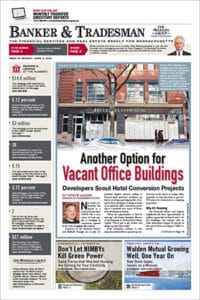
Steffen Landrum
I began my life’s journey living in and around Boston’s Mildred C. Hailey (formerly Bromley-Heath) housing project. I regularly visit my paternal grandmother there, after whom the community center is named.
A couple of decades and military deployments later I am somewhat removed from this community that I spent a significant portion of my childhood in, my grandmother being my only remaining tie. However, something my grandmother highlights with each visit is there are good people that come from the projects.
My grandmother will never leave Hailey and has been a resident since the 1950s. She made her decision final with the passing of her aunt. When Aunt Rachel passed, she bequeathed to my grandmother her only wealth: her home. She lived across the street from my grandmother, a “by chance” purchase with her husband so that they could be closer to my grandmother and her young family.
My grandmother does not have an advanced education and is a victim of the segregated system of education and bigotry of her time. Fortunately, she had the wherewithal to give the house to a couple of her children so that they may do what she could not. Her thoughtfulness had a positive impact on me, beyond providing me with shelter, because with land comes wealth.
Raised separately by both parents, I watched my mother also produce with little. We started off on welfare and graduated from public housing, to living with family members, to renting apartments. She worked hard, calling family for help only if we were in great need. She eventually became a homeowner.
These examples epitomize the traditional “American Dream” of ownership and entrepreneurship. They are the reason why I became a landlord which took years of hard work. Over the past decade Boston had several leadership changes. As a resident and landlord this has been bitter-sweet, only to be exasperated by COVID-19.
Renters and Landlords Want Equal Protection
Know that as landlords we want the same thing as our tenants do from Boston leadership: equal protection.
Many landlords are both residents and small business owners that represent the community. A considerable portion of landlords were not born with a large financial advantage. We are not large developers building 100-plus units in Mattapan Square, with the ability to “donate” hundreds of thousands of dollars to political campaigns. We are the “mom and pop” of living accommodations, like the bodegas scattered throughout Boston.
What do I mean by protection? Basically, renters have a right to a safe home and landlords have a right to be fairly compensated for this expensive service.
Nothing has emphasized this point more than the COVID-19 pandemic. An eviction moratorium was almost immediately emplaced, yet there have been no guarantees in compensation to the landlord. The few “stop-gap” landlord assistance measures that have been emplaced are convoluted and require a layered bureaucratic process for landlord assistance.
For example, mortgage forbearance only delays the problem; it is not a solution. Approximately more than three–quarters of the rents you collect as a landlord go to immediate expenses, such as mortgages, taxes, insurance and repairs, not to mention your own labor costs and unexpected maintenance.
Understandably we are in unprecedented times and no one with a conscience wants to see another human being out on the street, let alone be the causal factor. However, our elected officials fell and are currently falling short on representing all of us that make up this community. Landlords are not being brought to the table to help Boston face its growing safe and affordable housing challenge.
We Must Be at the Table, Too
Requiring the registration of houses for inspection, notifying the city of Boston on notices-to-quit – as required by last fall’s Housing Stability Notification Act – and zoning are examples of policies put into place without landlord input. These policies make for great soundbites during election campaigns; however, they are redundant, a waste of tax dollars and do little to help tenants.
As landlords, we face many city requirements to operate our small businesses. Our profit margins are thin, with little opportunity for growth by creating more units in our existing portfolios as a way to compensate for the cost of added regulations. We cannot, for example, operate lodging houses without Zoning Board of Appeals approval, a bureaucratic process involving neighborhood meetings where we can be denied at any step along the way.
For Boston to genuinely meet the housing demands of today and the future we need to create more housing and overhaul our zoning process and requirements. Mom–and–pop landlords do not have an army of lawyers that can spend all day at City Hall, the Boston Planning & Development Agency and the city’s Inspectional Services Department to advocate for our position and make friends with our elected officials.
To solve Boston’s affordable housing crunch, landlords and our representatives like MassLandlords need a seat at the table. Like the local restaurants, we deserve to have input to address the post-pandemic recovery and lingering housing crisis. We all want the same thing.
Steffen Landrum is a member of the board of directors of MassLandlords Inc. and a landlord in Boston.





